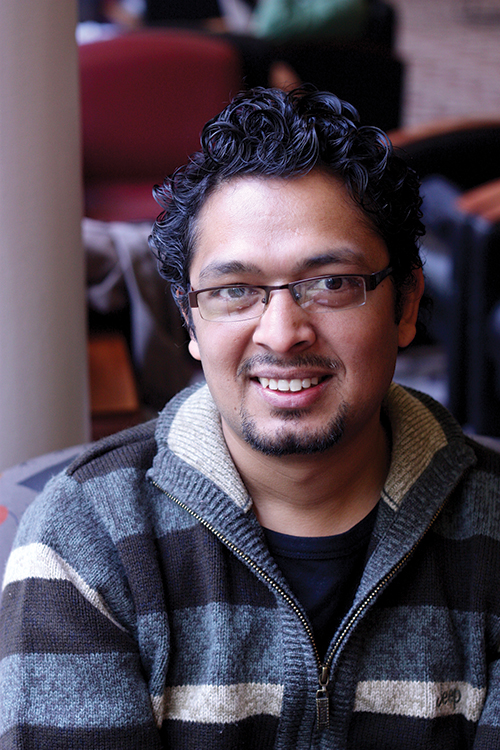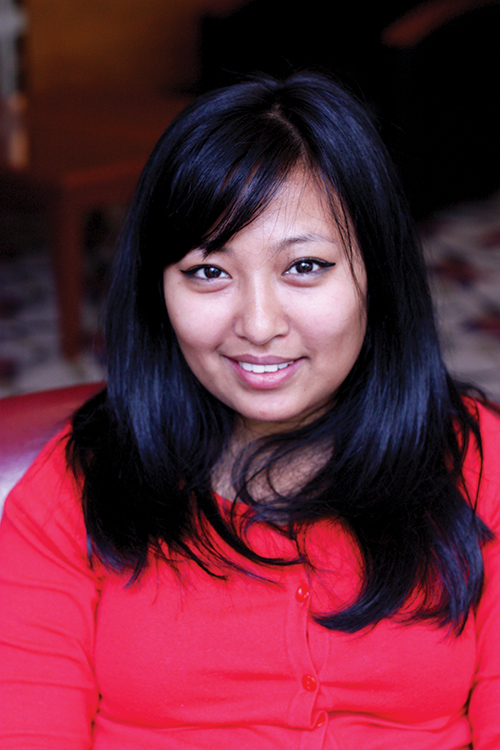Surya Joshi reminisces about a time in Nepal when the daily news would open with body counts.
“That was the new normal,” Joshi said.
Surya Joshi reminisces about a time in Nepal when the daily news would open with body counts.
“That was the new normal,” Joshi said.
Surya Joshi reminisces about a time in Nepal when the daily news would open with body counts.
“That was the new normal,” Joshi said.

The “new normal” included bomb blasts, jet strikes, school closures. Political unrest was palpable—and Joshi ultimately lost a relative in one of the shootings.
He and Lisha Shrestha, both graduate students in Portland State’s conflict resolution program, were teenagers in the capital city of Katmandu when the Nepalese Civil War began to unravel.
“We weren’t in the direct war zones,” Shrestha said. “But it affected every aspect of our lives.”
From 1996 to 2006, a civil war between Maoist fighters and government forces played out—with the most devastating ramifications hitting those in the most remote reaches of Nepal.

It was to these far-western districts that Joshi and Shrestha, who both studied at Katmandu University, traveled in 2007, in the tremulous wake of the civil strife.
Shrestha submitted a proposal to a development organization that entailed a closer look at post-conflict Nepal. Her proposal was selected, and thus began an eye-opening journey.
“Abduction was rampant in those regions. The Maoists would abduct middle-schoolers, the young members of families. Sons and daughters. They were then forced to carry out army posts,” Shrestha said. Many others were siphoned into the Maoist movement in false hope for a better future, she said. Thirteen thousand people died during the war.
In one instance, a woman whose sons were abducted and whose husband had gone to India to look for work was left her to fend for herself, Joshi said.
“Her field was barren. There was no one to work there,” she said.
Agricultural and civilian losses were punctuated by the loss of something more fundamental: basic human trust.
As they walked along a mountain road, Joshi and Shrestha were faced with piercing stares from behind half-open doors.
“People had fear in their eyes when they saw us—because we were from a different part of the country. No one except for one woman was even willing to give us a place to stay the night,” Shrestha said.
“In our culture, guests are considered your god,” Joshi said, underscoring how harsh the rejection was.
Something had to be done to heal the trauma.
A burning passion for healing their nation’s wounds eventually led the duo to PSU’s Department of Conflict Resolution, where they have intensively studied resolution methods and integrated them into community outreach programs in the Portland area.
They are working on a thesis, called the Intergroup Dialogue Project, that aims to implement what they’ve learned through the program in conducting a needs assessment for addressing the aftermath of the civil strife in Nepal.
Aimee Clott, a professor of conflict resolution who has been an advisor for Shrestha and Joshi, spoke glowingly of their commitment to the project.
“They have met every cross-cultural challenge,” she said, explaining that both Joshi and Shrestha hold numerous jobs. Joshi is volunteering with Lutheran Community Services Northwest and is also working with a neighborhood evening school for the Bhutanese community. Shrestha is a facilitator with the Immigrant and Refugee Community
Organization and works with refugees as they grapple with trauma and cultural adaptation.
Last year, Clott developed a manual of intergroup dialogue that, with Joshi and Shrestha, she has modified to address post-conflict reconstruction efforts being obstructed by ethnic conflict in Nepal.
Joshi and Shrestha credit the program for empowering them with the skills needed to shape their country’s renewal.
“I used to see conflict resolution from an external, political perspective,” Shrestha said. “But now I realize we need to understand conflict from within. We need to understand our own feelings. Then, only, can we understand others.”
“In Nepal, in the name of conflict resolution, people always debate and discuss. But we never listen to the other person,” Joshi said. Post-conflict Nepal, struggling with new ethnic conflicts, is subject to marked inequalities—worsening the situation, they explained.
Joshi cited South Africa’s post-apartheid Truth and Reconciliation Commission as a possible model for the work that needs to be done in Nepal. “How can we break the ice?” he asked.
Joshi and Shrestha want to train facilitators in fruitful dialogue, aiming to create a permanent infrastructure. They hope to design a curriculum for communication that can be implemented in the conflict-torn regions of Nepal.
“At this point we have all the key pieces in place. We have applied to several different foundations and have submitted grants. It’s just a matter of getting more funding,” Clott said.
Shrestha has a large-scale vision for the future of the project.
“If it gets success, then we want to replicate that in other parts of the district, and gather results, and submit it to the ministry and have them work on that nationally,” she said.
Both feel that the Nepalese people must be brought into the fold. Marginalized communities who live under the daunting shadow of poverty and isolation have, they explained, often been neglected in attempts at political dialogue.
“How do we create dialogue in a safe environment between communities with different ideologies?” Shrestha asked.
Ultimately, both Joshi and Shrestha vow to pursue that question tirelessly.
This gives us all hope of things to come from this way of thinking. Hopefully you can show the world how problems can be solved! Keep up the good work for US!!!